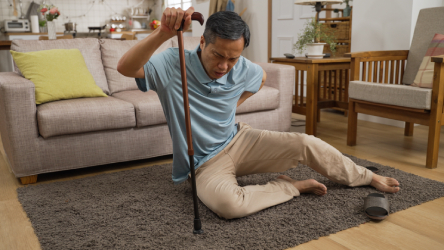NCD Watch
Be Falls Aware
23 August 2022 (Tue)

Falls are of public health concern due to their high incidence and possibly significant injurious consequences. Many people fall and sustain injuries every day as a result of slipping on wet floors, being tripped by clutters, falling from heights or furniture, collision with or shoving by another person. Falls do not ‘just happen’. In fact, they are often resulted from an interaction of multiple risk factors involving the faller and the environment.
The Unintentional Injury Survey 2018 conducted by the Department of Health (DH) showed that fall was the most common type of unintentional injury, accounting for 39.4% of all injury episodes that occurred over a 12-month period. Analysed by gender, females (47.1%) reported a higher proportion of fall-related injuries than males (31.0%). By age group, falls contributed to 66.4%, 61.8% and 88.6% of injury episodes among young children aged 4 or below, elders aged 65–74 and those aged 75 or above, respectively. The survey also observed that pre-existing functional difficulties or chronic diseases and lack of physical activity were associated with the increased rate of falls. Regarding safety measures adopted against falls, households with elderly aged 65 or above showed low adoption rates of specific safety measures against falls.
On top of ensuring home safety, removing environmental hazards and using assistive devices, leading a healthy lifestyle also plays a key role in fall prevention. Healthy living keeps bones strong that helps reduce the risk of osteoporosis-related fractures after falls. The general public are advised to lead a healthy lifestyle by:
- Being physically active
- Refraining from alcohol use
- Eating a balanced diet
- Do not smoke
DH will continue working in close partnership with community partners to raise public awareness of fall prevention and support effective application of proven interventions against falls.
Source: NCD Watch August 2022This link will open in a new window






































